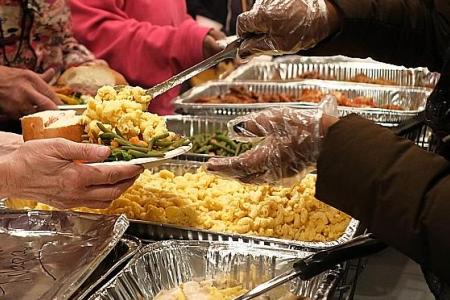4 in 10 over-cater for guests, but more want to reduce food waste
NEA study shows more people here taking steps to reduce wastage to save money and the environment
If there is one fear people in Singapore have when playing host during the holiday season, it is not having enough food to go around.
This is borne out by findings in a survey commissioned by the National Environment Agency (NEA), which found four in 10 respondents - or 41 per cent - said they would cater for more guests than expected.
Four in 10 said they would prepare just enough food for the expected number of guests, while the rest said they cater for fewer than the expected guests.
Mr Daniel Tay, founder of SG Food Rescue, said this phenomenon could be due to Singaporeans' need to "save face".
He said that people think it is "better to have more than enough and throw away the rest, than to have to deal with the embarrassment of not having enough food for guests".
The ground-up movement collects unsold food such as fresh produce, processed food items and even cooked food from businesses to redistribute to others such as friends, neighbours, cleaners, security guards and construction workers.
Mr Tay noted that free events or events that do not require registration tend to have more food wastage - which can be prevented with adequate planning.
He suggests organisers contact "food rescue" groups a week ahead if they expect a lot of leftover food.
The findings of the study were released by NEA yesterday to encourage Singaporeans to reduce food waste during the festive season.
The survey, which covered 1,000 Singapore residents between March and April, sought to better understand consumer perceptions, behaviours and attitudes towards food waste.
A similar survey of 1,000 individuals was conducted in 2015.
Ms Pui Cuifen, founding member of Foodscape Collective, a community for sustainable food systems, said caterers typically provide more food than the amount ordered.
"Knowing this, I'd typically order food for 75 per cent of the number of expected guests.
"I would also ask guests in advance what food they would avoid and confirm whether they would require food."
Ms Fang Xinyan, 30, agreed with the move to cater for less than the number of guests.
The founder of local start-up YoRipe - a platform that suggests recipes to consumers based on their dietary preferences, health goals and cooking skills - said her rule of thumb is to cater for 20 per cent less than the number of guests expected.
"You will definitely have people who arrive having eaten, people who don't like what you have prepared, or people who brought food ."
Since 2013, Ms Fang has been buying reduced-to-clear items such as chicken, vegetables and cheese. These products are fast approaching their expiry dates and sold by supermarkets at a discount.
"I find that in Singapore, these items are still very fresh, even though they are going to expire," she said.
Ms Fang developed an app - also called YoRipe, which she calls a "Google Calendar for food" - that allows users to track how much food they have left in their fridge and to remind them before the food goes bad.
The same study also found that more people here are concerned about food wastage and are taking steps to do their part.
Eighty per cent of respondents said they are "bothered" when uneaten food is thrown away and know of the environmental impact of food waste.
More people have also adopted various habits to reduce food waste, compared with those surveyed in 2015.
About 56 per cent said they would take away unfinished food when eating out, up from 44 per cent in 2015. And 32 per cent said they would buy fruits and vegetables with slight imperfections, compared with 23 per cent previously.
About 38 per cent were open to buying food close to its expiry date at a discount, up from the previous 18 per cent.
The respondents cited two key motivations to reduce food waste, with 93 per cent looking to save money and 92 per cent out to protect the environment.
Eight in 10 wanted more information on how to reduce waste.
The NEA said yesterday: "Many thought that more information, such as how to store food and ingredients to make them last longer and how to share excess food, could help them reduce food wastage.
"They also said they would waste less food if they had the option to order smaller portions at eating establishments."
FOR MORE, READ THE STRAITS TIMES
Get The New Paper on your phone with the free TNP app. Download from the Apple App Store or Google Play Store now



